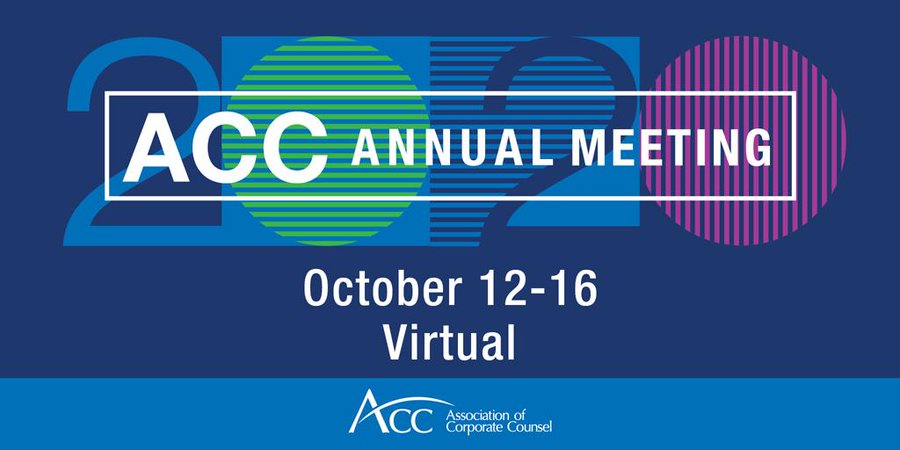#ACCAM20: Ethical Implications of Legal Tech and Social Media

Competence. Confidentiality. Integrity. What do these ethical duties have to do with legal technology and social media? More than in-house counsel may realize.
Professional responsibility rules in most states require attorneys to stay up to date on relevant technology. More and more, in-house counsel cannot ethically represent companies without understanding how to leverage these technologies and how they impact a client’s day-to-day business.
But what information should in-house counsel know about legal tech and social media to comply with their ethical duties? These and other issues will be addressed at Understanding Legal Tech & Social Media: Your Professional Responsibility, a panel moderated by Practical Law editors from Thomson Reuters at the upcoming Association of Corporate Counsel (ACC) Annual Meeting.
Duty of Competence
Most states have adopted some form of American Bar Association Model Rule of Professional Conduct (ABA Model Rule) 1.1. This rule requires attorneys to have the knowledge and skills necessary to provide competent representation. Many states have extended the rule to specifically require that attorneys have technological competence. In these states, attorneys must keep up with changes in relevant technology and understand its benefits and risks (ABA Model Rule 1.1 cmt. 8). For example, most corporate disputes today involve electronically stored information (ESI). Ethically and practically, this requires in-house counsel to understand at minimum the basics of how to properly handle ESI in the event of a dispute.
As with ESI, legal tech and social media are here to stay. Understanding these technologies and their impact on the legal industry and a company’s bottom line are critical to in-house counsel’s professional responsibility.
Legal Tech Is Booming
Attorneys are increasingly using artificial intelligence and other legal tech to boost efficiency and reduce costs when performing various legal tasks, including:
- Reviewing, analyzing, and managing contracts.
- Drafting contracts and legal memoranda.
- Legal research.
- Collecting, preserving and processing ESI.
- Formulating litigation strategy.
- Analyzing court orders.
- Predicting judicial rulings.
Additionally, in-house counsel’s use of legal tech to enhance online collaboration has skyrocketed due to COVID-19.
Given the increasing availability of so much technology that can dramatically increase efficiency, reduce costs and support better communication in an organization, attorneys can no longer avoid legal tech. Ethically, counsel must ensure they are using the right tools for their client, while also understanding the risks and benefits of introducing new technologies. See Practical Law Practice Note, Artificial Intelligence and Legal Ethics, w-018-1743.
Social Media Can Raise a Host of Ethical Issues
Social media includes internet or mobile-based platforms, websites, applications, and services that allow users to communicate with each other. It’s everywhere. The prevalence of social media has changed how attorneys interact, communicate and work. Even if in-house counsel does not have or intend to use a social media account, the duty of competence requires counsel for any company in the modern world to know how social media functions. To properly advise clients, counsel must also understand how easily and widely information on social media can be disseminated and misused. See Practical Law Practice Note, Social Media Ethics for Attorneys, w-013-1896.
In addition to the duty of competence, many other ethical rules come into play with social media. For example:
- Depending on the content, just one post by counsel about their company on personal social media accounts could trigger ethical rules on attorney-client communications, confidentiality, conflict of interest, truthfulness in statements to others, and misconduct.
- Adding a specialization or failing to delete an endorsement on counsel’s social media profile could trigger ethical rules on advertising, truthfulness in statements to others and misconduct.
Attendees at the 2020 ACC Annual Meeting can learn more by signing up for Understanding Legal Tech & Social Media: Your Professional Responsibility, featuring Justin Castillo, general counsel for BT Federal Inc.; Marc Melzer, director of Legal Affairs for Jun Group; and Lucy Bassli, founder of InnoLegal Services, PLLC and Legal Strategy Advisor for LawGeex. This interactive panel, sponsored by Thomson Reuters, will take place on Oct. 13 from 4:45 – 5:45 p.m. EDT.
Panelists will discuss what attorneys need to know about legal tech and social media from an ethical and practical perspective, what to do and not to do with social media, and how counsel can determine what types of legal tech make sense for their legal departments and companies. Attendees will have the opportunity to participate in poll questions on various technologies and potential ethical pitfalls. The panel also will provide attendees with virtual takeaway materials offering additional insight into legal tech and social media issues for attorneys.
This post was written by Lauren Sobel and Jessica Brand, senior legal editors, Litigation, Thomson Reuters.